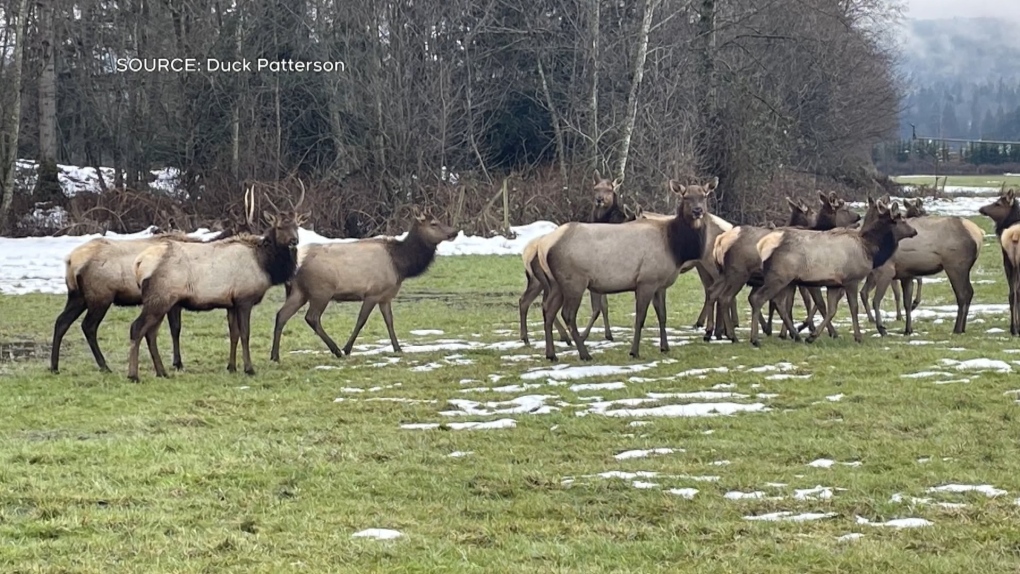Vancouver Island farmers struggle to deal with threatened elk species
 (Duck Patterson)
(Duck Patterson)
Farmers in the Cowichan Valley are losing crops and dealing with property and field damage caused by Roosevelt Elk, which have become a regular fixture on some farms in the area.
The threatened species typically moves to lower elevations during the winter months searching for more plentiful food, but in the last few years, in the Duncan area, some herds have been staying year-round on farmland.
In North Oyster, where Howie Davis has farmed cattle for more than 50 years, a herd of 12 elk showed up in December four years ago. Fortunately for him, they've so far always left by February or March.
"The herds are expanding every year," said Davis.
In the few months the elk are on the farm, Davis said they cause a lot of damage, knocking down fences, tearing the hay fields up with their hooves and eating whatever hay is growing over the winter "right down to nothing."
The elk damage to the hay fields has reduced the number of harvests from four to three in a season, said Davis.
"That’s one crop you don’t get to sell, less income," he said. "[The provincial government has] been compensating me for that … not to what it costs."
A University of Alberta research project intended to reduce human-elk conflict in the Cowichan Valley started in August 2021.
The team has set up multiple trail cameras in the valley to gather data on the herds' numbers and movements.
"To implement any sort of management strategies we need to have a good understanding of what’s happening with the population, how many are there, where are they on the landscape and how are they interacting with human infrastructure?" said Kate Rutherford, a masters student at the University of Alberta.
Rutherford says the provincial government has put a lot of effort into increasing the elk herds in the Cowichan Valley to create a healthy, sustainable population, which seems to have paid off.
"Everyone wants the population to be at healthy levels," she said.
"There’s also that balance, right, with maintaining a healthy population size but also minimizing the occurrence of human-elk conflict, which is going to increase as urbanization increases," she added.
Researchers are also planning to test deterrents to keep elk out of farms.
"We plan to broadcast predator vocalization on the perimeter of these fields where we’re currently monitoring elk using camera traps, and they will be broadcasted when triggered by animal movement," said Rutherford.
The team is also asking landowners in the area to contribute to their research by reporting elk sightings to them either through the iNaturalist app or by emailing the team directly at rooselk@ualberta.ca
The researchers hope to share their work with farmers and the provincial government as way to help with the management of Roosevelt Elk.
CTVNews.ca Top Stories

'One of the single most terrifying things ever': Ontario couple among passengers on sinking tour boat in Dominican Republic
A Toronto couple are speaking out about their 'extremely dangerous' experience on board a sinking tour boat in the Dominican Republic last week.
Half of Canadians have negative opinion of latest Liberal budget: poll
A new poll suggests the Liberals have not won over voters with their latest budget, though there is broad support for their plan to build millions of homes.
opinion Why you should protect your investments by naming a trusted contact person
Appointing a trusted person to help with financial obligations can give you peace of mind. In his personal finance column for CTVNews.ca, Christopher Liew outlines the key benefits of naming a confidant to take over your financial responsibilities, if the need ever arises.
Teacher shortages see some Ontario high school students awarded perfect grades on midterm exams
Students at a high school in York Region have been awarded perfect marks on their midterm exams in three subjects – not because of their academic performances however, but because they had no teacher.
'My stomach dropped': Winnipeg man speaks out after being criminally harassed following single online date
A Winnipeg man said a single date gone wrong led to years of criminal harassment, false arrests, stress and depression.
Doctors combine a pig kidney transplant and a heart device in a bid to extend woman's life
Doctors have transplanted a pig kidney into a New Jersey woman who was near death, part of a dramatic pair of surgeries that also stabilized her failing heart.
Photographer alleges he was forced to watch Megan Thee Stallion have sex and was unfairly fired
A photographer who worked for Megan Thee Stallion said in a lawsuit filed Tuesday that he was forced to watch her have sex, was unfairly fired soon after and was abused as her employee.
Ottawa injects another $36M into vaccine injury compensation fund
The federal government has added $36.4 million to a program designed to support people who have been seriously injured or killed by vaccines since the end of 2020.
An Ontario senior thought he called Geek Squad for help with his printer. Instead, he got scammed out of $25,000
An Ontario senior’s attempt to get technical help online led him into a spoofing scam where he lost $25,000. Now, he’s sharing his story to warn others.
































